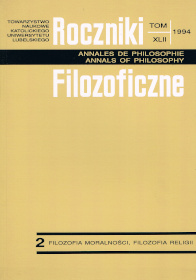Ethics and International Relations
(transl. by Zofia Kolbuszewska & Rafał Wierzchosławski)
Abstract
The author speaks not as a philosopher but as a practitioner of foreign policy, drawing on his own experience of international relations and on his observations of current events − for example in Europe.
The speech covers three different issues. The first one is "ethics and the foreign policy practitioner": how, if at all, ethical considerations bear on diplomats in their work? Some principle of action is necessary and better than none, and, in the world as it is, no principle resting on a broader criterion such as the interest of the entire human race is a conceivable basis for action by states. In the last analyses, foreign policy makers must judge particular cases in the particular circumstances of the structure of international relations in which they find themselves. Ethical criteria, or rules of conduct, can only be guidelines. Moral and ethical judgements must always be particular.
The second issue is that of "ethics and institutions, or forms of organization": do particular forms of organisation of human communities have value? Can one form be "better" than another? When common decisions have to be reached by a number of separate states which still have different interests and perceptions, they become subject to compromises and trade offs. This is an inevitable part of the process of creating, gradually, a common foreign policy; but there are disadvantages as well as advantages in making policy on a broader basis than that of the national state.
In the final part of his speech, concerning "ethics and intervention", the author touches on some current problems and the ethical dilemmas they rise; in particular the question of intervention in the internal affairs of states. One of the features of the modern world is a great demand for intervention in the internal affairs of states whether on humanitarian grounds or to stop bloodshed. Should these pressures be resisted, and what are the ethics of intervention? Should there be a right of intervention for the relief of humanitarian distress, or for the prevention of terrorism, or for the weapons of mass destruction, or for other reasons? International law and the fabric of the UN may be imperfect and incomplete, but they are all that we have as a framework for the relations of states. It is difficult to conceive a strong enough reason for setting them aside or going beyond them.
How should a diplomat approach difficult ethical decisions which arise in his work? The author's belief is that a diplomat should study history, weigh up the consequences of his actions as best as he can (and there can be no certainty) and be fully alive to the effects that disasters, environmental and human, far away may have on the interests and his own country. That means also trying to educate his own public opinion, because the politician cannot move far beyond what his public opinion will allow. That is both the dilemma and the strength of democratic politics.
Copyright (c) 1994 Roczniki Filozoficzne

This work is licensed under a Creative Commons Attribution-NonCommercial-NoDerivatives 4.0 International License.





